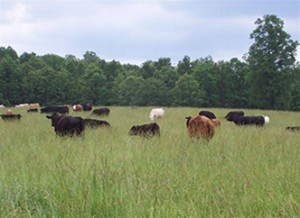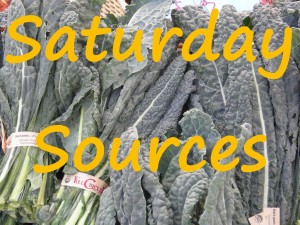Saturday Sources: Missouri Grassfed Beef
This is my second edition of Saturday Sources and I am pleased to have an interview with Jeremy Parker of Missouri Grassfed Beef.
I have been getting my beef from Jeremy of Missouri Grassfed Beef for several years. I love the good relationship I have with him and so many of the farmers that I purchase from regularly. I know he is passionate about what he does so I wanted to ask him some questions to share with all of you. Even if you aren’t local to us here in St. Louis hopefully these questions and answers will help you to find a good source of grassfed beef near you. Every farmer is going to do things a little bit different but this should give you some ideas about the kinds of questions you should be asking.
Oh and while I have had some grassfed beef that was tough and not very tasty that has been the exception and not the rule. None of the beef I have gotten from Jeremy has been tough, it has all been tender and flavorful. Of course you need to know how to cook it to preserve the flavor. All those recipes for fast, hot cooking are intended for corn fed beef which is full of water and need some help to get that water out of the meat. Grassfed beef in general does best with low and slow cooking. I love The Grassfed Gourmet Cookbook for recipes and tips on how to cook pasture raised meats for the best flavor and results.

-PattyLA

How did you get started?
My start was probably easier than most. My grandfather and great grand father started the farm in 1945, just after WW 2. It has always been primarily a cattle farm, along with pigs for a few decades. There was also an attempt to grow grain during the 60’s, but they realized that the thin soil was much better suited for grazing and hay production. My grandfather passed in 2004, and the farm went into auto pilot mode for about 4 years, with the cattle herd slowly dwindling down, along with the fences and everything else. I was in the corporate world at the time, and my dad and uncle were not yet retired. We all pitched in when we could, but it wasn’t enough to run it properly.
My grandmother asked me if i would take charge after she was gone, and to make the most of the farm and keep it intact for future generations. She passed away in March 2008, and i decided that i was not going to let Grandma down. I had become aware of the growing demand for grass fed beef, and after extensive research, realized that was the only way to go. The cows and calves had always been grass fed, so there wasn’t much to change in that regard.
I left my job, and my dad and uncle soon retired. We started borrowing money to buy more cows, and also started massive fencing and water projects in order to graze more efficiently(rotational grazing). We just completed those projects this spring. I’m sure glad we had those water tanks installed, because this summer would have been devastating otherwise. (Missouri experienced a major drought this summer along with much of the country)
Back to 2008…I started Missouri Grass Fed Beef as a marketing company for the beef from our farm, in order to help stabilize our income, and not be at the mercy of the commodities market. As I sell beef to individuals, I pay the farm top market price for the calves at the time of butcher. Unfortunately, beef prices and expenses keep climbing.
Why Grassfed? Isn’t Corn Fed Beef “better”?
There is indisputable scientific evidence that grassfed has more vitamins, minerals, good fats, and less saturated fat than cornfed, plus it tastes better. Prior to the past few years, we have been told that corn fed beef was the best in the world, and we were kept ignorant of feedlot practices. Just remember, commercial food production is a multi-billion dollar business, and some will do and say whatever it takes to please share holders.
What do your animals eat if fresh grass isn’t available?
We harvest our own hay, a mixture of fescue, orchard grass, timothy, clovers, and such. They eat this for about three months out of the year. We stockpile some grass each fall that they can graze until january, unless there is an ice storm.
We did have to buy some hay this summer, though, for the first time that I can remember. We fed hay for about 40 days during the drought.
Are your cattle ever given antibiotics? If yes when and why and what do you do with those cattle after that?
Only if a young calf is sick with pneumonia or diarreaha, and they are sold at a commercial livestock auction when they are big enough. They will ultimately end up at a feedlot. We put numbered ear tags on each calf when they are young, so we can keep accurate records.
Are your cattle ever given steroids or other growth enhancers?
No, never!
One of my readers wanted to know if you can make a living doing this?
I’m sure trying to! It’s been a break even venture so far, after calculating expenses year after year. I do see us being more profitable in the upcoming years, because there are always a lot of expenses at the start of any business. I should mention that I have been able to do this because of my wife. She works 40 +hours a week, and that helps a lot!
How many beeves a year do you raise/sell?
Typically 120-150, but the numbers are down a little this year because we had to sell some at a younger age this summer due to the drought. Their mothers had quit producing milk, and they weren’t growing well as a result. We didn’t want the mother cows to get over stressed with the extreme environmental conditions they were already dealing with.
How often do you have beeves to sell? Are they “in season” at certain times?
I try to have some available every month, but typically early fall and late spring are when the most calves are ready. I have a few left for Dec., but then it will be Feb. before I have anymore
How might a person go about ordering from you?
The best way is to go through the website, www.eatmograssfedbeef.com.
What should I know about ordering a half or whole beef?
What the average cost per lb will be after processing, how much freezer space do you need, how much beef does your family eat per week/month, have I tasted grass fed beef before, is grass fed beef harder to cook, that you are dealing with a reputable farm, that it is entirely grass fed, grass finished(most are not)
What is your favorite cut of beef to eat?
Tough question… can I say all of them? I guess it depends on the cooking method. If i’m grilling, a sirloin is my go to. For a slicing roast, the eye of round can’t be beat. For a crockpot roast, give me the chuck or arm. I usually butcher 2-3 beef per month for the farmer’s market at Tower Grove, and we eat whatever package might be damaged. I can honestly say that I’ve enjoyed every single cut imaginable, you just have to cook some different than others. The one that I probably won’t eat again is kidneys…I don’t know how the British do it 
Is there anything else that you want my readers to know?
I’m sure there is, but I can’t think of anything right now. I’d be happy to answer any follow up questions, though.
Feel free to post any follow up questions below and I will be sure to get them to Jeremy and get his answers back here for you.
Many of my blog posts contain affiliate links. Purchasing through an affiliate link allows me to keep blogging and sharing what I learn with you. It is a bit like leaving a tip for service and is very much appreciated. Thank You! -PattyLA





















